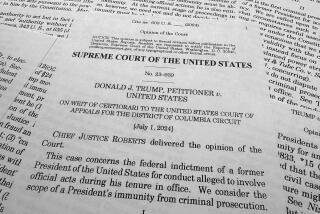Airlines Exempt From Law on Disabled Rights
WASHINGTON — Disabled people traveling on the nation’s airlines are not covered by federal civil rights laws that protect the handicapped, the Supreme Court ruled Friday.
In reversing a lower court, the justices said in a 6-3 decision that the handicapped rights law applies to federally funded airports but not to airlines that use them.
Attorneys for the airlines played down the decision, saying that handicapped people are already well served by most carriers.
But leaders of groups representing the disabled said their members are often denied the right to fly without a companion, and they criticized the high court for blocking suits charging the airlines with unequal treatment of the handicapped.
Plaintiff Disappointed
“It is disappointing to discover that a law which is supposed to cover handicapped persons doesn’t cover this important aspect of our daily lives,” said Gordon Mansfield, associate executive director of Paralyzed Veterans of America, which brought the suit along with the American Council for the Blind.
Mansfield said that his group, which represents 12,000 people with spinal cord injuries, will seek a stronger civil rights law for the handicapped.
“We want a law that says you have the same civil rights as everyone else in the country,” he said. “We don’t want to see any persons subjected to humiliating treatment or denial of access to air travel. And that is happening now.”
In Friday’s ruling, the justices narrowly interpreted a 1973 law that says no handicapped person may “be excluded from participation in, be denied the benefits of, or be subjected to discrimination under any program or activity receiving federal financial assistance.”
Last year, an appeals court for the District of Columbia said that the Transportation Department must issue detailed rules to cover the treatment of the handicapped by the nation’s airlines. The appeals court reasoned that the law covered “all air carriers by virtue of the extensive program of federal financial assistance to airports.”
Ruling by Powell
However, in the ruling that overturned that decision, Justice Lewis F. Powell Jr. drew a distinction between those receiving federal funds and those benefiting from them.
“Not a single penny of the money is given to the airlines,” Powell said, writing for the majority. “The recipient for the purposes of (the 1973 law) is the operators of the airport and not its users.” (U.S. Dept. of Transportation vs. Paralyzed Veterans, 85-289.)
This decision is in line with a ruling by the high court two years ago in the Grove City College case, which determined that federal laws barring sex bias in education apply only to specific campus programs receiving federal money, not to the college itself.
Dissenting in the airline case were Justices Thurgood Marshall, William J. Brennan Jr. and Harry A. Blackmun, who complained that the court read the law too narrowly.
“If the commercial airline companies barred the handicapped from traveling on their airlines at all, then that conduct would deny the handicapped the benefits of federally funded programs and activities relating to the airport and airway system,” Marshall wrote.
Lawyers Differ on Impact
The competing lawyers differed on the practical impact of the ruling, although both sides agreed that the airlines may not blatantly discriminate against the handicapped. They agreed that statutes calling for “safe and adequate service” by the airlines have been viewed as a “general prohibition against discrimination.”
David Berg, a lawyer for the Airport Transport Assn., which represents the major carriers, said the high court “made the correct decision in this case, but it doesn’t have much significance. The airlines are not going to change how they handle the handicapped, and, in general, they provide the services which would have been required by the regulations” that the lower court had ordered drawn up.
But an attorney who represents blind and deaf people said airlines differ considerably in how they treat the handicapped.
“We have cases of deaf persons or the blind who are told they can’t fly unless they have someone with them. The airlines just tell them it’s not safe,” said Karen Peltz Strauss of the National Center for Law and the Deaf in Washington.
Case of Pregnant Teacher
In another action, the justices ruled that an Ohio civil rights commission may investigate the case of a teacher at a religious school who was fired after she became pregnant.
School officials believed that the woman should stay at home to rear the child and also said she violated the “Biblical chain of command” by getting a lawyer to appeal her firing. The high court did not settle the issue but only overturned a lower court order favoring the school. (Ohio Civil Rights Commission vs. Dayton Christian Schools, 85-488.)
More to Read
Sign up for Essential California
The most important California stories and recommendations in your inbox every morning.
You may occasionally receive promotional content from the Los Angeles Times.










